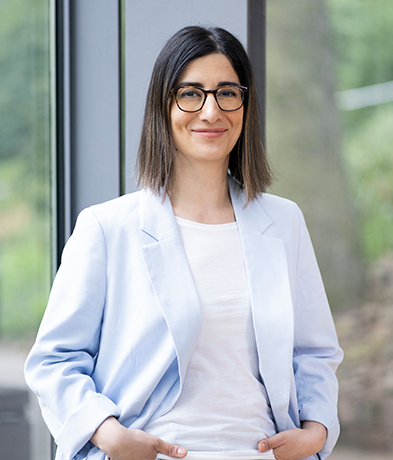Erwünschte Wirkung
Wir fördern innovative Projekte und Forschungsvorhaben im MINT-Bildungsbereich, die langfristig und nachhaltig zur Verbesserung von Bildungschancen und -qualität beitragen, digitale und fachbezogene Kompetenzen fördern, soziale Integration stärken und individuelle Lernbedürfnisse berücksichtigen.
Hintergrund
In einer sich rasant entwickelnden Gesellschaftsform, in der die gesellschaftliche Teilhabe mit einem umfangreichen Verständnis von Wissenschaft und deren Disziplinen zusammenhängt, kommt den MINT-Fächern eine zentrale Rolle zu. Durch entsprechende MINT-Kompetenzen entwickeln Menschen ein besseres Verständnis für die Naturgesetze, Technologien und mathematischen Prinzipien, die unsere Welt prägen. MINT-Bildung ist daher entscheidend für die persönliche Entwicklung, die berufliche Perspektive und den Fortschritt einer Gesellschaft als Ganzes.
Unser Ziel ist es daher insbesondere mit Innovationen und Pilotprojekten neue Wege einzuschlagen und die Bildungslandschaft in Deutschland systemisch zu verbessern.
Ihr Weg zur Projektförderung in dieser Förderlinie
Eine Beschreibung unserer allgemeinen Antragskriterien und des Antragsprozesses finden Sie >hier<.
Bitte senden Sie Ihren vollständigen Kurzantrag (siehe unten) sowie einen Nachweis der Gemeinnützigkeit (§58a AO oder §60a AO) oder Anerkennung der Gemeinnützigkeit durch das Finanzamt (Freistellungsbescheid) an antrag@klaus-tschira-stiftung.de. Und bitte beachten Sie: Der Betreff Ihrer E-Mail sollte: „Förderlinie: Innovative Bildung – Projektantrag: <Projekt-Kurztitel>“ lauten.
Mit Einreichung des Antrags stimmen Sie zu, dass wir Ihre personen- und antragsbezogenen Daten für die Bearbeitung des Antrags verarbeiten und speichern. Wir behalten uns vor, diese auch an externe Gutachtende weiterzuleiten. Die Klaus Tschira Stiftung gGmbH wird die hier bereitgestellten Informationen ausschließlich in Übereinstimmung mit unseren >Datenschutzhinweisen< verwenden.
Kurzantrag für Projekte der Förderlinie Innovative Bildung
Ihr Kurzantrag sollte maximal 5 Seiten (13.000 Zeichen) umfassen und folgendermaßen aufgebaut sein:
- Prägnanter Projektüberblick (max. 2.000 Zeichen):
- Um was geht es?
- Was sind die Ziele Ihres Projekts?
- Wie sollen diese Ziele erreicht werden?
- Factsheet (tabellarisch, max. 3.000 Zeichen): Projekttitel, Projektbeginn, Projektende, zu erwartende Gesamtkosten, detaillierter Budgetplan aufgeschlüsselt nach Personal- und Sachmitteln sowie Overhead, Zukunftsvision für das Projekt nach Ablauf der Projektlaufzeit, Name der am Projekt beteiligten Institutionen, Adressdaten, E-Mail-Adresse, Telefonnummer, projektverantwortliche Person, Nennung weiterer Drittmittelgeber:innen (im Antrag befindlicher und/oder bereits bewilligter Mittel), sowie deren Bezug bzw. Abgrenzung zu den bei der Klaus Tschira Stiftung beantragten Mitteln.
- Projektskizze (max. 6.000 Zeichen): Nennung der angestrebten Ergebnisse, Beschreibung der Projektpartnerinnen und –partner, Zielgruppendefinition und -zugang, Forschungsfragen und Überblick der Methodik, Zeit- und Finanzplan inklusive Arbeitspakete mit Meilensteinen und Zuweisung der beteiligten Projektpartnerinnen und -partner, Pläne zur Verbreitung der Ergebnisse an I) Fachpublikum (open data / open science) und/oder II) Öffentlichkeit.
- Beschreibung der Evaluierung des Projekterfolges (max. 2.000 Zeichen): Was sind Ihre eigenen Erfolgsindikatoren und wie messen Sie diese?
- Als Anhang: Nachweis der Gemeinnützigkeit (§58a AO oder §60a AO) oder Anerkennung der Gemeinnützigkeit durch das Finanzamt (Freistellungsbescheid).
Darüber hinaus laden wir Sie ein, uns mögliche Gutachtende vorzuschlagen. Gerne können Sie uns auch mitteilen, wenn Sie einzelne Personen aufgrund möglicher Interessenskonflikte als Gutachtende ausschließen möchten.
Nach positiver Erstprüfung bitten wir Sie gegebenenfalls um einen virtuellen Pitch. Sollten Sie einen schriftlichen Vollantrag bevorzugen, setzen Sie sich bitte mit uns in Verbindung.
Informationen zum Ablauf des Pitches erhalten Sie per E-Mail von uns. Bitte strukturieren Sie Ihren 30-minütigen foliengestützten Pitch-Vortrag so, dass die Gutachtenden das Projekt gemäß der Bewertungsmatrix (>Download hier<) begutachten können.
Haben Sie weitere Fragen? Dann schauen Sie gerne in unseren FAQs vorbei!
Informationssprechstunden zur Förderlinie „Innovative Bildung“
Die Klaus Tschira Stiftung bietet im Rahmen der Förderlinie „Innovative Bildung“ regelmäßig Informationssprechstunden an. Diese richten sich an alle Interessierten sowie potenziellen Antragsteller:innen, die konkrete Verständnisfragen zu den inhaltlichen Anforderungen der Ausschreibung haben.
Wann?
Die nächsten Sprechstunden finden an folgenden Terminen jeweils zwischen 9:00 und 14:00 Uhr statt:
- Freitag, 8. August 2025
- Freitag, 22. August 2025
Wie?
Die Gespräche erfolgen telefonisch. Um allen Anrufenden gerecht zu werden, steht pro Anfrage ein Zeitfenster von maximal 15 Minuten zur Verfügung. Bitte kontaktieren Sie Alev Dreger während der genannten Zeiten direkt unter: 06221 533 119.
Wichtiger Hinweis:
Wir bitten darum, von schriftlichen oder telefonischen Anfragen außerhalb der Sprechstunden abzusehen.
Für formale oder administrative Anliegen – etwa zu Fristen, Antragsformularen oder Einreichungswegen – steht Ihnen unser Fördermanagement-Team gerne zur Verfügung: antrag@klaus-tschira-stiftung.de
Wir freuen uns auf den persönlichen Austausch mit Ihnen!

